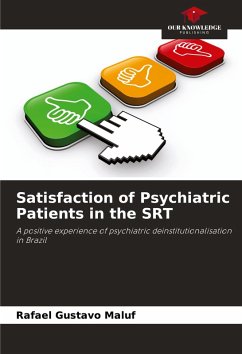The city of Barbacena, Minas Gerais, has a unique history in the Brazilian anti-asylum struggle. Since the beginning of the 20th century, seven large psychiatric hospitals have been set up in this municipality. The occurrence of more than 60,000 deaths due to negligence, mistreatment and violence in psychiatric hospital wards produced a strong social stigma. In this sense, the need to respond adequately to the hospital-centred model emerged. At the same time as the decline of the psychiatric asylum model, community mental health services were developed. The satisfaction of psychiatric patients is one of the best indicators of the quality of mental health services. This study evaluates the satisfaction of psychiatric patients who use the Therapeutic Residential Service (TRS) in the city of Barbacena, Minas Gerais, Brazil.
Bitte wählen Sie Ihr Anliegen aus.
Rechnungen
Retourenschein anfordern
Bestellstatus
Storno








